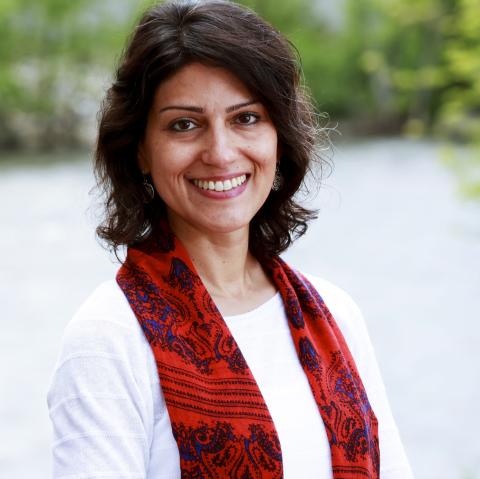
Growing up with media images of faraway children carrying machine guns struck a chord with Professor Melinda Negrón-Gonzales, lighting a spark that evolved into a lifelong interest in global studies and human conflict.
Initially aspiring to journalism, she switched to anthropology, then eventually to political science where she found her sweet spot. A graduate of the University of Florida, where Melinda earned her Ph.D., she advises her students from first-hand experience that entering a range of academic disciplines allows them to pivot their careers to follow their passion. As the first college student in her family, Negrón-Gonzales had to navigate her own path, eventually choosing her current role as a UNH Associate Professor.
Inspired by one of her undergraduate professors to dive into Turkish studies, Negrón-Gonzales spent two months in Turkey before beginning work on her doctorate. She returned in 2005 to live in Istanbul, learn the language, and pursue independent research. Earning a Fulbright fellowship in 2006 necessitated a move to the capital city of Ankara as part of Middle East Technical University. Her studies have made Melinda part of a small group of regional specialists with a focus on social movements.
Initially intending to pursue a career in nonprofit work, Negrón-Gonzales grew to love the environment of higher education during her time as a graduate teaching assistant.
“I enjoyed the interaction with students, especially that pivotal moment when they break through preconceived notions to see things from a broader perspective.”
Learning to teach within the online format was a challenge but Negrón-Gonzales developed ways to foster good discussion and refined her methods to align with the online instruction modality. The university awarded Melinda the UNH Excellence in Teaching Award in 2013.
This pairing of pedagogy with technology paved the way for her plan for the 2021 launch of a fully online master’s program of Global Conflict and Human Security. Targeting working professionals, Negrón-Gonzales includes courses that teach students to blend their scholastic knowledge with project management skills so they can design, measure, and evaluate international development programs. A hallmark of Melinda’s work philosophy is the need for an ongoing conversation between academic specialists and boots-on-the-ground personnel.
“By reaching out to those in the field, academics can help others to expand their perspective beyond immediate events. Conversely, activists can educate academics about the concrete struggles of people facing threats to their security. There is a clear need for ongoing dialogue between these two groups in an exchange that fosters a deeper understanding on both sides.”
The United Nations identifies seven dimensions of human welfare that fall under its human security umbrella: food, health, economic, environmental, political, personal, and community security. Negrón-Gonzales hopes to attract students entering the fields of humanitarian relief and global development to develop their skills and make a positive impact on threats to these dimensions of human security in areas of conflict.
“The human security approach covers every aspect of life when people try to access food, water, medical care, shelter and safety. Many nonprofit organizations and foreign aid programs focus on specific needs but they must keep an eye on the bigger picture to see how their specific interventions affect various dimensions of human security. I want our students to design programs from a holistic perspective and be able to evaluate their effectiveness.”
Negrón-Gonzales notes that many conflicts during the past twenty years are increasingly linked to climate issues such as drought and flooding with their resulting food and water insecurity. Disruption of basic human needs breeds conflict, which in turn exacerbates competition for dwindling resources, often further degrading human rights. She expects to see this pattern of conflict expand as climate change worsens human security globally.
Her published writings reveal a common, underlying theme of human rights. Several of Professor Negrón-Gonzales’ research articles focus on R2P (Responsibility to Protect), a 2005 initiative that proposes the United Nations assume a global role to ensure the wellbeing of populations facing atrocities such as genocide. Driven by several key states, this “emerging norm” has slowly gained support but many nations remain concerned about their sovereignty in domestic matters.
At the 2019 Third International Kurdish Studies Conference at Middlesex University in London, Negrón-Gonzales presented to scholars from 22 countries a paper entitled “Three Decades of Seeking Justice for the Disappeared in Turkey” as part of her research for a book project on human rights activism in Turkey. She conducted interviews with Turkish activists to discover the strategies and tactics employed by civil society organizations concerning the hundreds of disappearances of mostly Kurdish men in the mid-1990s during the peak of internal armed conflict.
“I relished the opportunity to learn more about the research being conducted by Kurdish scholars in Iraq and Turkey, and I am now in the newly created Kurdish Research Network, a transnational network connecting scholars working in and on Greater Kurdistan (Turkey, Iran, Iraq, Syria).”
Fascinated by people who maintain their optimism and passion for human rights causes, Melinda quotes a Turkish activist who claims that during times of repression “survival is resistance”. She explains that activists around the world participate in solidarity networks that reach beyond their own borders, sharing information and providing support to those engaged in struggles for social justice. Negrón-Gonzales encourages diversity and internationalism in her program, recognizing the importance of building bridges by sharing experiences.
“Local knowledge is important. The more we share perspectives, the better we understand each other and appreciate local challenges. This is crucial for foreign aid programs because no one has all the answers. We need to listen and learn.”
Although threats to human security abound throughout human history, agents who promote tolerance, compassion, and inclusion can help build a durable peace.
- written by Gwendolyn Goguelet